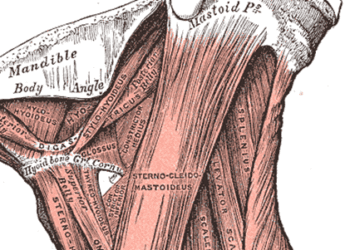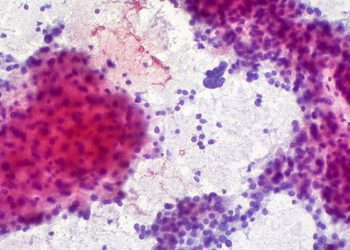Talimogene laherparepvec addition to pembrolizumab showed no significant clinical improvement in advanced melanoma
1. Talimogene laherparepvec plus pembrolizumab did not significantly increase progression-free survival or overall survival compared to placebo plus pembrolizumab in advanced melanoma patients.
2. Talimogene laherparepvec plus pembrolizumab did not significantly increase toxicity compared to placebo plus pembrolizumab treatment.
Evidence Rating Level: 1 (Excellent)
Study Rundown: A previous phase I trial of talimogene laherparepvec (T-VEC, a herpes simplex virus-1-based immunotherapy) plus pembrolizumab (a programmed cell death 1 inhibitor) showed a promising complete response rate in advanced melanoma patients. This study explored the efficacy and safety of T-VEC plus pembrolizumab in unresectable advanced stage melanoma patients. Patients were randomly assigned to receive T-VEC plus pembrolizumab or placebo plus pembrolizumab. Generally, progression-free survival (PFS) and overall survival (OS) were not significantly different between both arms. However, there was a numerical PFS difference in favour of the T-VEC plus pembrolizumab arm. There was also a PFS benefit in T-VEC and pembrolizumab arm for three predefined subgroups, but this did not translate to an OS benefit. Slight increases in objective response rate (ORR), complete response rate (CRR), and durable response rate (DRR) were observed in the T-VEC plus pembrolizumab arm. Occurrence of treatment-related adverse events was slightly higher in the T-VEC plus pembrolizumab arm, with pyrexia and fatigue being the most common among both arms. Incidence of treatment-related adverse events of grades 3 or higher was similar in both arms. Limitations to this study include a larger population of stage III and IV melanoma patients compared to other similar trials and a predominantly white population. The strength of this study is that it has limited bias given its design and that it did not show a significant increase in toxicity, unlike other combination therapies used in melanoma. Overall, T-VEC plus pembrolizumab is not a viable treatment option for advanced melanoma patients, but its findings warrants further study into other combination strategies that also do not increase toxicity, while hopefully improving survival.
Click to read the study in the JCO
Relevant Reading: Oncolytic virotherapy promotes intratumoral t cell infiltration and improves anti-pd-1 immunotherapy
In-Depth [randomized control trial]: This international phase III trial included 692 patients with advanced unresectable melanoma. They were randomly assigned in a 1:1 ratio to receive T-VEC plus pembrolizumab or placebo plus pembrolizumab; 346 patents were in each arm. There was no statistical difference in PFS (hazard ratio [HR], 0.86; 95% confidence interval [CI], 0.71 to 1.04; P=0.13) or OS (HR. 96; 95% CI, 0.76 to 1.22; P=0.74) between both arms. There was, however, a numerical difference of 5.8 months in favour of the T-VEC plus pembrolizumab arm. Also, despite no OS benefit, PFS benefit was observed in the following three predefined subgroups: patients from the United States (HR, 0.59; 95% CI, 0.37 to 0.92), patients with baseline LDH < upper limit of normal (HR, 0.76; 95% CI, 0.59 to 0.99), and patients with baseline sum of the longest diameters of target lesions < the median (HR, 0.70; 95% CI, 0.51 to 0.96). Treatment with T-VEC plus pembrolizumab led to a ORR of 48.6 (95% CI, 43.3 to 53.8), a CRR of 17.9% (95% CI, 13.9 to 22.0), and a DRR of 42.2% (95% CI, 37.0 to 47.4), compared to 41.3% (95% CI, 36.1 to 45.5), 11.6% (95% CI, 8.2 to 14.9), and 34.1% (95% CI, 29.1 to 39.1) in the placebo plus pembrolizumab arm, respectively. Treatment-related adverse events (TRAEs) were 88.4% and 74.6% in the T-VEC-pembrolizumab arm and placebo-pembrolizumab arm, respectively, with most common adverse events being pyrexia and fatigue. Grades 3 or higher TRAEs occurred in 20.3% and 15.7%, respectively. Immune-related adverse events most commonly included thyroid dysfunction. Overall, T-VEC addition to pembrolizumab did not increase PFS or OS in advanced melanoma patients.
Image: PD
©2022 2 Minute Medicine, Inc. All rights reserved. No works may be reproduced without expressed written consent from 2 Minute Medicine, Inc. Inquire about licensing here. No article should be construed as medical advice and is not intended as such by the authors or by 2 Minute Medicine, Inc.









